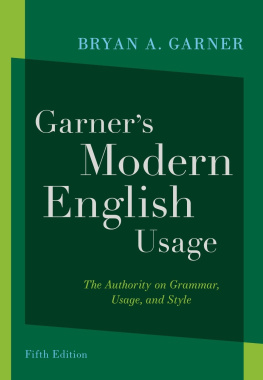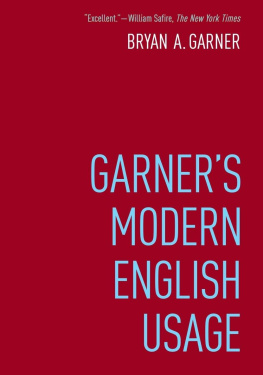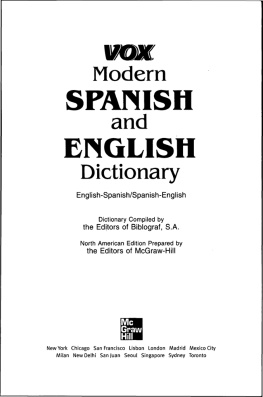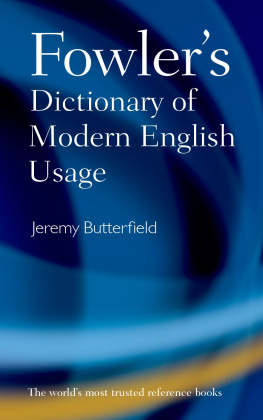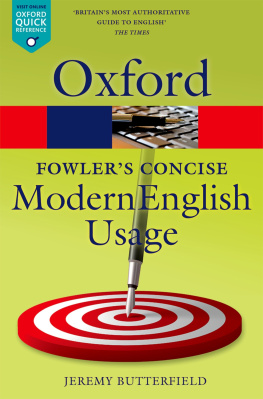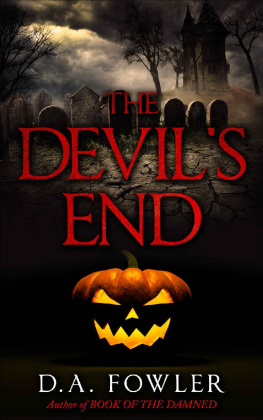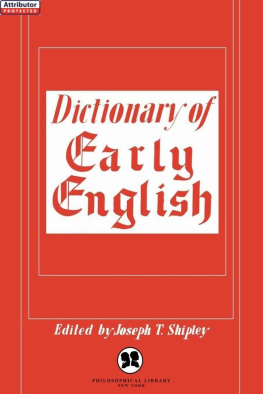H. W. Fowler - A Dictionary of Modern English Usage
Here you can read online H. W. Fowler - A Dictionary of Modern English Usage full text of the book (entire story) in english for free. Download pdf and epub, get meaning, cover and reviews about this ebook. year: 2009, publisher: OUP Premium, genre: Art. Description of the work, (preface) as well as reviews are available. Best literature library LitArk.com created for fans of good reading and offers a wide selection of genres:
Romance novel
Science fiction
Adventure
Detective
Science
History
Home and family
Prose
Art
Politics
Computer
Non-fiction
Religion
Business
Children
Humor
Choose a favorite category and find really read worthwhile books. Enjoy immersion in the world of imagination, feel the emotions of the characters or learn something new for yourself, make an fascinating discovery.

- Book:A Dictionary of Modern English Usage
- Author:
- Publisher:OUP Premium
- Genre:
- Year:2009
- Rating:5 / 5
- Favourites:Add to favourites
- Your mark:
- 100
- 1
- 2
- 3
- 4
- 5
A Dictionary of Modern English Usage: summary, description and annotation
We offer to read an annotation, description, summary or preface (depends on what the author of the book "A Dictionary of Modern English Usage" wrote himself). If you haven't found the necessary information about the book — write in the comments, we will try to find it.
A Dictionary of Modern English Usage — read online for free the complete book (whole text) full work
Below is the text of the book, divided by pages. System saving the place of the last page read, allows you to conveniently read the book "A Dictionary of Modern English Usage" online for free, without having to search again every time where you left off. Put a bookmark, and you can go to the page where you finished reading at any time.
Font size:
Interval:
Bookmark:
A DICTIONARY
MODERN
ENGLISH USAGE
H. W. FOWLER
MODERN
ENGLISH USAGE

Edited with an Introduction and Notes by
DAVID CRYSTAL


Great Clarendon Street, Oxford ox2 6DP
Oxford University Press is a department of the University of Oxford.
It furthers the Universitys objective of excellence in research, scholarship,
and education by publishing worldwide in
Oxford New York
Auckland Cape Town Dar es Salaam Hong Kong Karachi
Kuala Lumpur Madrid Melbourne Mexico City Nairobi
New Delhi Shanghai Taipei Toronto
With offices in
Argentina Austria Brazil Chile Czech Republic France Greece
Guatemala Hungary Italy Japan Poland Portugal Singapore
South Korea Switzerland Thailand Turkey Ukraine Vietnam
Oxford is a registered trade mark of Oxford University Press
in the UK and in certain other countries
Published in the United States
by Oxford University Press Inc., New York
Editorial material David Crystal 2009
The moral rights of the author have been asserted
Database right Oxford University Press (maker)
A Dictionary of Modern English Usage first published 1926
This edition first published 2009
All rights reserved. No part of this publication may be reproduced,
stored in a retrieval system, or transmitted, in any form or by any means,
without the prior permission in writing of Oxford University Press,
or as expressly permitted by law, or under terms agreed with the appropriate
reprographics rights organization. Enquiries concerning reproduction
outside the scope of the above should be sent to the Rights Department,
Oxford University Press, at the address above
You must not circulate this book in any other binding or cover
and you must impose the same condition on any acquirer
British Library Cataloguing in Publication Data
Data available
Library of Congress CataloginginPublication Data
Library of Congress Control Number: 2009921241
Typeset by Cepha Imaging Private Ltd., Bangalore, India
Printed in Great Britain by
Clays Ltd., St Ives plc
ISBN 978-0199535347
1 3 5 7 9 1 0 8 6 4 2
No book had more influence on twentieth-century attitudes to the English language in Britain than Henry Fowlers Dictionary of Modern English Usage. Within a few years, people no longer felt it necessary even to mention the title and talked simply of Fowler. Adjectives soon followedFowlerian, Fowlerish, Fowleresqueand he eventually received the ultimate linguistic accolade, of being turned into a common noun. The practice continues. In February 2008 William F. Buckley wrote a piece for the United Press Syndicate on the verbal traps used by Obama and Clinton in the race for the democratic nomination: it was entitled A Fowlers of Polities.
How did the Dictionary come to be written? The memorial note at the front of the book tells us that Henry and his brother Frank began to plan the book together in 1911. It was a curious arrangement. They were committed to working on The Pocket Oxford Dictionary, the successor to the Concise Oxford Dictionary, which they had completed that year. But Henry was horrified at the thought of the drudgery involved in compiling another dictionary, and wanted to devote his linguistic energies to something more creative. The brothers therefore agreed that Frank would work on the Pocket and Henry on a different kind of book, and they would exchange roles after each had completed a quarter or so of their respective textsthat is, if Henry could bring himself to being a lexicographer again. Henry would often comment on his misolexicography, as he put it: I am no true lexicographer, he wrote in a letter to his Oxford publisher in his seventies, saying that the only parts of the science of language he cared about were grammar & idiom.
In fact, the idea for the book had first come up in 1907, following the warm reception given to The Kings English the year before. The publishers were interested in a follow-up companion, and Henry responded with the suggestion that they write something in which approval & condemnation [would be] less stingily dealt out than has been possible in the official atmosphere of a complete dictionary. They first proposed a large idioms dictionary, but this was turned down. They then suggested a shorter book which would warn against the unidiomatic, and this was welcomed. Oxford University Press referred to it as the Reduced Idioms Dictionary, and later as the Perfect Englishspeakers Companion. Following lengthy discussions with the Press over the kind of information to be included, the scope was widened to include observations on spelling and pronunciation.
Henry had completed only about a quarter of the book when the First World War began, and he and Frankdespite their ages enlisted. When the War ended, he tried to work on it again, but, following Franks death in 1918, he found his time totally taken up with the need to complete the Pocket Dictionary, which he eventually sent to the Press in 1922. He was relieved then to be able to return to what he called his general vade-mecum of English writing. The Society for Pure English had been established in 1913, but was forced to abandon its plans until what it called the national distraction of the War was over. When it began publishing its Tracts after the War, the series contained several of the longer articles Fowler was preparing for his book. He eventually sent it to press at the end of 1923. A move from Guernsey to Somerset led to a considerable delay in processing the proofs, and it took another three years before the Dictionary saw the light of day. It was published on 22 April 1926.
Fowlers life coincided with a remarkable period in British linguistic history. The growth of comparative philology in the early nineteenth century had led to an explosion of interest in the history of language and languages, and one of the consequences was the increased study of English and its regional varieties. The Early English Text Society was founded in 1864. The English Dialect Society began publishing its regional volumes in 1873. The International Phonetic Association was formed in France in 1886 and presented its first phonetic alphabet two years later. Daniel Jones, who would become Britains best-known phonetician, published the first edition of his English Pronouncing Dictionary in 1917. Most importantly, the Philological Society (established in the year Fowler was born) was planning its first major project in lexicography. It was eventually entrusted to James Murray, who in 1879 began the gargantuan task of compiling the New English Dictionarywhich would appear, over fifty years later, as the Oxford English Dictionary. Fascicles of different letters were to be published from 1884, and Fowler kept abreast of them.
It was also a great age of individualists. In 1873 Isaac Pitman founded his Phonetic Institute in Bath, advocating the importance of shorthand and spelling reform. In 1878 the Dorset writer William Barnes made his case for maintaining the Anglo-Saxon character of English in his Outline of English Speech-Craft. And a few years later George Bernard Shaw took up the cudgels on behalf of spelling reform, simplified punctuation, and other language projects, one of whichthe application of phonetics in elocutionreceived a dramatic interpretation in the form of
Next pageFont size:
Interval:
Bookmark:
Similar books «A Dictionary of Modern English Usage»
Look at similar books to A Dictionary of Modern English Usage. We have selected literature similar in name and meaning in the hope of providing readers with more options to find new, interesting, not yet read works.
Discussion, reviews of the book A Dictionary of Modern English Usage and just readers' own opinions. Leave your comments, write what you think about the work, its meaning or the main characters. Specify what exactly you liked and what you didn't like, and why you think so.


